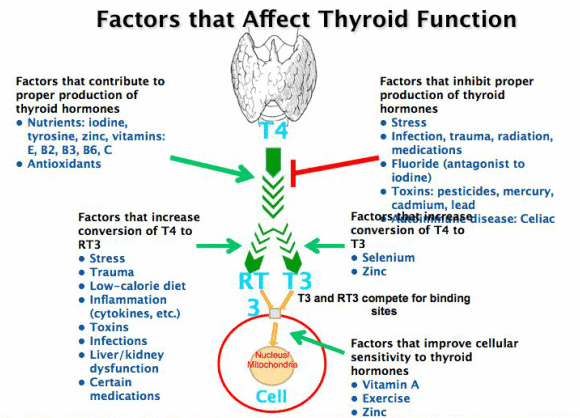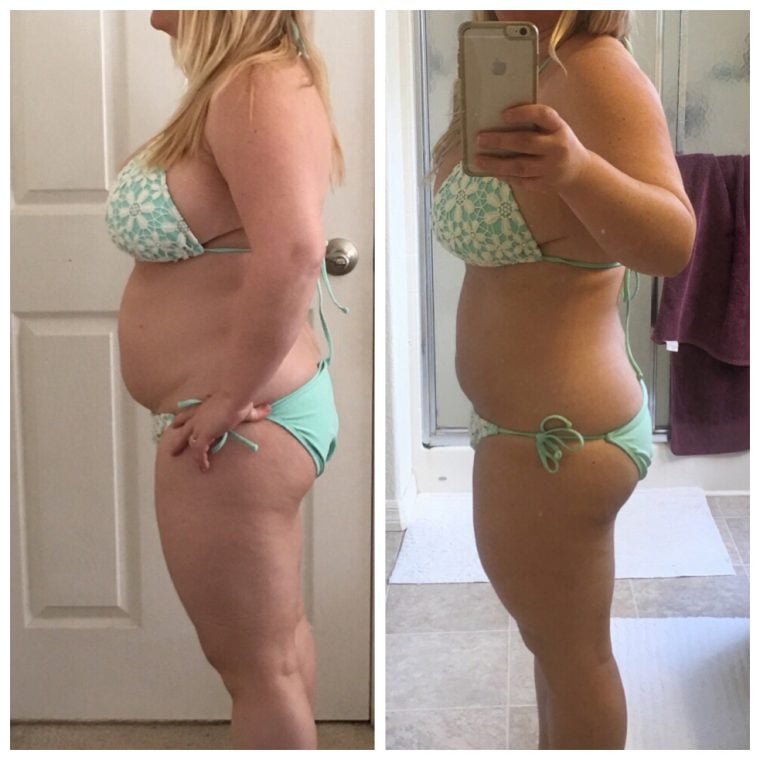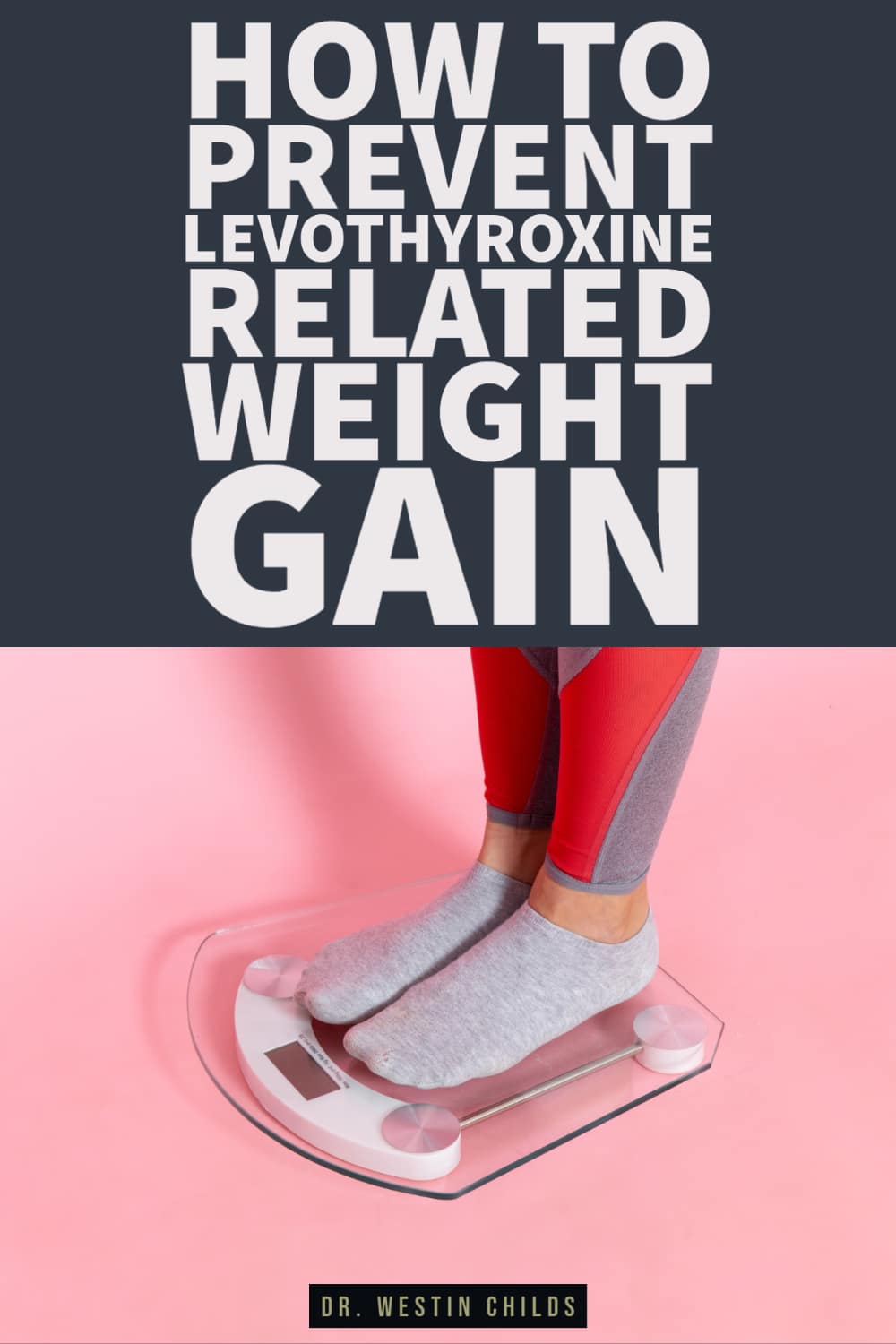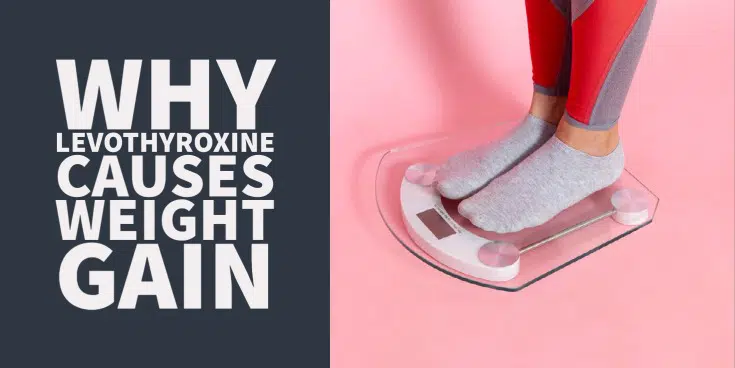Are you on Levothyroxine but still gaining weight?
Believe it or not, this is a big problem for a lot of people.
But the bigger question is this:
How can you be gaining weight on a medication that is supposed to INCREASE your metabolism?
Is it even possible?
Well, the truth is that Levothyroxine doesn’t necessarily increase your metabolism… at least not in everyone.
In this post I’m going to show you exactly why Levothyroxine can cause weight gain and what you can do about it:
DOWNLOAD FREE RESOURCES
Foods to Avoid if you Have Thyroid Problems:
I’ve found that these 10 foods cause the most problems for thyroid patients. Learn which foods you should avoid if you have thyroid disease of any type.
The Complete List of Thyroid Lab tests:
The list includes optimal ranges, normal ranges, and the complete list of tests you need to diagnose and manage thyroid disease correctly!
T4 to T3 Conversion Matters… A lot
Before we talk about how Levothyroxine and Synthroid can cause weight gain we need to talk about some basic thyroid physiology.
Your thyroid, under the influence of TSH (if working properly), pumps out primarily the thyroid hormone T4.
What you need to understand is that T4 is an inactive hormone. By itself it doesn’t do anything for your body except act as a reservoir for T3 and T3 is the active thyroid hormone in your body.
T3 is what enters your cells and turns on the genes that increase your metabolism, help with hair growth, and give you energy.
In order for T4 thyroid hormone to be active in your body, it MUST be converted to the active hormone T3.
The problem is that T4 doesn’t always convert to T3:

(This image shows what is required to convert T4 into the active free T3 hormone, it also outlines what causes your body to turn T4 into the inactive reverse T3)
You see:
Your body has two options:
1. Turn T4 into T3 which enters into your cells and activates genetic transcription (this is what you WANT to have happened and what most doctors assume is happening)
or…
2. Turn into Reverse T3 which blocks thyroid action, lowers metabolism, and makes patients feel like they are hypothyroid (this is what you DON’T want to happen but ends up happening in many patients on T4-only medications)
The more reverse T3 in your bloodstream the less you can rely on normal thyroid blood tests to give you any actionable information.
So if you understand this concept the next question you should be asking yourself is this:
What causes your body to turn T4 into the inactive reverse T3?
Levothyroxine and Synthroid are Both T4 only Medications
So here is the primary problem:
Levothyroxine and Synthroid are both T4-only medications.
Most Doctors will prescribe T4 medication under the assumption that your body will have no problem converting T4 into T3.
And in a perfect world, a world without stress, inflammation, or other hormonal imbalances – it would.
But that’s not the world we live in…
Nowadays it’s VERY uncommon if someone has their stress managed, has no issues with blood sugar/insulin/leptin, has a normal menstrual cycle, is not overweight, has never done yo-yo diets, or has a normal adrenal function.
Do any of these symptoms or situations sound familiar?
Chances are high that you are dealing with 1 or more of them.
And in states such as these, your body will turn T4 into reverse T3 as a way to “put on the brakes” and slow down your metabolism and cause symptoms of hypothyroidism.
How Levothyroxine Causes weight gain
So how does this all relate to Levothyroxine and weight gain?
We can look at some studies to help us understand:
Take for instance this study. (1)
Patients in this study were given T4-only medications and treated based on their TSH.
The researchers tested their resting energy expenditure (this is a way to test for basal metabolic rate or metabolism) both before they added the thyroid hormone and after they suppressed the TSH.
Do you know what they found?
It showed that patients taking thyroid hormone (even doses that lower the TSH to <0.1) did NOT have an increase in metabolism or a change in their body weight.

This is really interesting information and it has profound implications for treatment…
For one it shows that our reliance upon TSH as a marker for managing thyroid medication and function is not very accurate.
Don’t get discouraged because there are other thyroid medications that actually do help with weight loss which we will discuss below.
But, for this reason (and many others) I generally don’t recommend using T4-only medications (like Synthroid and Levothyroxine) to treat hypothyroidism and I recommend against using the TSH to dose your medication.
What’s more:
This study also showed that suppressing the TSH did NOT result in adverse side effects.

One of the main reasons doctors are afraid to increase thyroid medications is because they are concerned that the low TSH will result in damage to the body over time.
It’s not uncommon that patients will start to feel better when their thyroid dose is increased, only to have all those symptoms come back again when they are told their dose is “too high”.
Don’t let your doctor convince you that you are hyperthyroid when you have crushing fatigue, weight gain, hair loss, and constipation – it just doesn’t work that way and you can’t tell someone they are hyperthyroid based on their TSH alone.
Here is another very interesting study (2) that compared people taking Natural Desiccated Thyroid to those taking Levothyroxine:

This study showed that patients taking Natural Desiccated Thyroid (Like Armour thyroid, Nature-Throid, and WP Thyroid) experienced more weight loss and HALF of the people in the study said that they preferred taking NDT over levothyroxine.

And here is another very important study (3) comparing equivalent dosing (based on pituitary function and TSH) of T4 medication vs T3-only medication:

This study showed that patients who were taking T3-only medication had more weight loss and better cholesterol than patients who were taking T4-only medication (like Synthroid and Levothyroxine).
What’s also important is that the patients who took T3 did not have any change in blood pressure, heart rate, or insulin sensitivity.
Meaning the T3-only thyroid medication was tolerated very well.
So now we have several different studies showing that patients not only do VERY well on medications containing T3 thyroid hormone but that these medications are also WELL tolerated.
You can read more about the use of T3-only medication (Liothyronine and Cytomel) for weight loss here.
Moral of the story?
Most patients not only prefer to take Natural desiccated thyroid (medication that includes T3 hormone) but this medication also results in more weight loss and improved quality of life.
One of the biggest problems with T4-only medication is that your body may NOT be converting it to the active T3 thyroid hormone.
In many patients, your body may actually convert it to reverse T3 thereby slowing your metabolism, and actually making your condition and symptoms WORSE.
But here is another important note side note:
Natural Desiccated Thyroid still contains T4 (in fact the majority is still T4).
That means that sometimes NDT can actually make hypothyroid symptoms worse as well by increasing reverse T3.
People with this problem need pure T3 medications like Liothyronine to improve symptoms and lose weight.
You can read more about case studies using NDT with T3 medications here.
What to do if you think Levothyroxine is Causing Weight Gain
If you have constantly gained weight (or even if you just aren’t losing weight) there are several steps you can take to figure out if the dose of thyroid medication you are taking is working in your body.
You can find a guide on how to properly dose Levothyroxine here.
These next steps are designed to help you determine if your body is turning T4 into T3 or if your body is turning your levothyroxine right into Reverse T3.
Some of these can be performed at home and others will require a Doctor.

It’s also worth pointing out that at the end of the day, you will need to find a doctor that is willing to work with you because if you are not getting enough thyroid hormone then you will either need MORE medication or a NEW medication to feel better.
Step #1: Check your Basal Body Temperature Each Morning
Checking your basal body temperature is a quick and easy way to estimate your basal metabolic rate.
Your basal metabolic rate is basically how many calories you are burning on a daily basis.
This number is really important when it comes to weight loss because it accounts for more than 90% of your total calories burned each day.
When you exercise you are only focusing on about 5-10% of your calories burned and it has little to no impact on your weight overall (this is why most of you who exercise aren’t losing weight).
If you are not on a high enough dose of thyroid hormone then your body temperature will be lower (4).
This also means that as you start thyroid hormone medication your body temperature should increase as you increase your dose.
If your body temperature is not increasing then this may be an early sign that you are on the wrong thyroid medication or the wrong dose of thyroid medication.
Many factors can alter your body temperature but it is a relatively easy way to check and when you combine it with the other methods listed below it can be quite effective.
You can read more about using basal body temperature to manage thyroid, adrenal, and fertility here.
How to check your basal body temperature:
- Each morning, as soon as you wake up and before you get out of bed, check your body temperature and record your results. It is very important that you stay in bed (do not get up to go to the bathroom) before you check your body temperature. Also, try to check the temperature at the same time every day.
- Plot your morning body temperature and watch for patterns. Your body temperature should be > 97.8. Period. Anything less than this indicates that your metabolism may be slowed. *Note that medications may interfere with the reliability of this test (medications like beta blockers, narcotics, diabetic medications, blood pressure medications, and antidepressants)
Step #2: Check your Resting Pulse or Resting Heart Rate
In addition to checking your basal body temperature, you should also be monitoring your resting heart rate.
Why?
Because hypothyroidism is well known to cause a slow heart rate (5) or low pulse (6).
Your resting heart rate is a reflection of your autonomic nervous system which is mediated by norepinephrine and adrenaline.
It’s also a reflection of your metabolism and your basal metabolic rate.
Some patients believe that their heart rate in the 50s is a “good” thing because they have heard that conditioned athletes have a slower pulse.
And that is true if you exercise daily and are not overweight at all, but if you do not exercise and you are 20+ pounds overweight your slow heart rate is NOT a good thing.
Instead, it is an early indicator that your body is NOT burning an adequate amount of calories per day which may ultimately lead to weight gain.
Another important point is that your resting heart rate should increase with the addition of thyroid hormone (especially T3), making this another great measurement to track as you start thyroid medication.
If you have hypothyroidism I recommend buying a wearable fitness device to monitor your pulse, how well you sleep, and how active you are throughout the day.
I will frequently request this data from my patients and use it to help adjust thyroid dosing.
Combining basal body temperature with resting heart rate is a very powerful combination and can help you determine how well you are being treated.
Your resting pulse should generally be > 50-60 at night while you sleep unless you are a well-conditioned athlete. A resting heart rate lower than that indicates an issue (though doesn’t necessarily mean it is thyroid-related).
As you increase your thyroid medication your resting pulse should be somewhere in the 70-80 range while you are awake and active.
If you are on medications like a beta blocker or narcotics it may interfere with your pulse rate/heart rate in addition to lowering your body temperature, so you must account for this if you are tracking both your body temperature and resting heart rate.
Step #3: Check a Complete Thyroid Panel
Finally one of the most important things you can do is to check a full and complete thyroid panel.
This will give you direct insight into how well your body is producing, converting, and utilizing thyroid hormones in the body.
EVERY patient with hypothyroidism should get this panel and they should understand the difference between “optimal” and “normal” levels.
Your Doctor is most likely basing his recommendations on the “normal” range, but I will show you what “optimal” range you should be shooting for in each test.
Please note that these values refer to patients who are NOT already on thyroid medication. If you are on thyroid medication then you need to use different ranges.
The complete thyroid panel:
- TSH – Should be < 2.0, anything higher than 2.0 is a problem, and being less than 2.0 does not mean you are normal (see this post on why the TSH is so inaccurate)
- Free T3 – Should be in the top 50% of the reference range, many patients have low T3 syndrome which means T3 is usually in the low-normal range but definitely not optimal
- Total T3 – Should be in the upper 1/2 of the reference range
- Free T4 – Should be in the top 50% of the reference range
- Reverse T3 – Should be less < than 15, anything higher indicates thyroid resistance and/or poor T4 to T3 conversion (patients with low free T3 syndrome often have low-normal free T3 with high reverse T3 levels)
- Thyroid Antibodies – Should be as close to 0 as possible, higher levels may indicate autoimmune thyroiditis and many patients with Hashimoto’s have symptoms of hypothyroidism with “normal” TSH values but still should be treated with thyroid hormone
- Sex Hormone Binding Globulin – Should be 70-80 in females and 20-30 in men, the SHBG will estimate the cellular function of thyroid hormone in the body (patients with low SHBG will often need higher doses of T3 containing medications)
It is VERY important that you not only get ALL of these tests but that you also look at the “optimal” numbers instead of the lab value reference ranges.
You want to compare yourself to healthy adults, not just the “average” adult… Because let’s face it, the “average” American adult is far from healthy.
By combining test results with basal body temperature and resting heart rate you can get a really good idea of how well your thyroid is functioning and how well your metabolism is working.
You should use these metrics to determine your thyroid dose to find the best thyroid medication and dose for your body.
How to Finally Lose Weight with Hypothyroidism
So what are you supposed to do if you still have hypothyroid symptoms with “normal lab tests”?
What are you supposed to do if you haven’t been able to lose weight despite increasing your dose of Levothyroxine or Synthroid?
You have 2 ways to go about this:
1. Change your thyroid medication to include T3-containing medications (NDT and/or T3-only medications)
2. Boost thyroid conversion by taking certain supplements and treating certain conditions that limit the conversion process (we will talk about this below)
The easiest (and probably most effective) way to increase thyroid function and lose weight is by adding pure T3 to your dose of Levothyroxine or Synthroid.
This allows you to bypass the T4 to T3 conversion process.
Your body can only make Reverse T3 if T4 is present, so if you only provide T3 to the body then it simply doesn’t have the option to create Reverse T3 and your levels will naturally fall.
This is one of the ways to “flush” out high levels of Reverse T3 in the body.
You can accomplish this by either switching from Levothyroxine to NDT or by simply adding liothyronine or Cytomel to your total dose.
This step will require that a Doctor is willing to work with you, however, which is why I always recommend seeking out a provider with advanced knowledge about thyroid function.
If your plan is to take this information to your current Doctor to get them to understand this information or to order the “right” tests it will most likely backfire.
If you don’t have anyone local to you, then you do have a few options:
Most conventional or traditional Doctors dislike natural desiccated thyroid medication so they are less likely to prescribe this, but usually, endocrinologists are willing to add small doses of Cytomel to your dose of T4.
Even adding 5-10mcg of liothyronine can be enough for some people (though not the majority).
If you can get your provider to switch you from Levothyroxine to NDT (Armour Thyroid, WP thyroid, or Nature Throid) then that might improve your symptoms as well.
As a primer remember this:
- T4 only medications: Levothyroxine, Synthroid, Levoxyl, Tirosint
- NDT (T4 + T3 medications): Armour thyroid, Nature-throid, WP thyroid
- T3-only medications: liothyronine, Cytomel, and SR T3 (compounded)
Most patients do better on medications that have T3 in them, so try and stick to the NDT and/or T3-only portions or simply combine them together.
Does Levothyroxine Ever Cause Weight Loss?
The answer is that YES Levothyroxine and Synthroid can cause weight loss but only in certain patients.
Since you are reading this you are most likely not one of those patients but I have written about it extensively in this post.
In order for Levothyroxine to cause weight loss, you must be able to adequately convert T4 to T3 without issues.
Some patients have single nucleotide polymorphisms (7) (genetic changes) which make T4 to T3 conversion very slow. If you have this polymorphism then Levothyroxine and Synthroid will probably not be the best medication for you.
On the opposite side of the spectrum, some patients are what I refer to as “super converters”.
You can give them T4 and they will turn it into T3 without any problems at all, and these patients often react to T3-containing medications with palpitations and/or anxiety.
Another subgroup of patients have reactions to the INACTIVE ingredients in Levothyroxine and Synthroid which may lead to intolerance of the medication.
If you can’t tolerate the proper dose of Levothyroxine or Synthroid then you won’t lose weight with the medication.
And lastly, patients who don’t have any other chronic medical conditions are more likely to do well on T4-only medications.
What I mean by that is this:
The more inflammation you have, the more chronic pain you have, the more medications you take, the more weight you have to lose, and the less likely you are to do well on levothyroxine.
Why?
Because all of these conditions will make thyroid conversion more difficult.
So yes, Levothyroxine can cause weight loss but it needs to be at the right dose and in the right individual.
As a quick aside, if your Doctor isn’t willing to add T3 or NDT to your regimen then you might be able to get him/her to prescribe Tirosint instead.
Tirosint is a T4-only medication but has very few inactive ingredients and many patients tolerate this medication better than Levothyroxine or Synthroid.
Tirosint is also helpful in patients with abdominal issues or with patients who are taking acid-blocking medications and studies show it has increased absorption in these settings (8).
- Bottom line: Even if your Doctor isn’t willing to change your medication to NDT, they still may be willing to either add Liothyronine (T3-only medication) or switch your Levothyroxine to Tirosint. Both of these options may improve your thyroid conversion and lead to weight loss in certain individuals.
5 Steps YOU can Take Today to Lose Weight and Boost Thyroid Function
There are several things YOU can do to optimize your thyroid function.
These steps should be taken in addition to the steps outlined above for the best results.
Whenever I treat patients I often employ multiple therapies at once for the multiplicative effect that it provides on metabolism and thyroid function.
Follow these steps below to naturally boost your thyroid function and reset the metabolic conditions that favor T4 to reverse T3 conversion:
1. Optimize T4 to T3 Conversion
One of the easiest things you can start with right away is making sure that you have all of the right nutrients for proper thyroid conversion.
You can read more in this post about the 13+ nutrients required for proper thyroid creation, metabolism, and conversion but I will go over the most important below.
The two primary nutrients involved in the conversion pathway are zinc and selenium.
It also happens that MANY patients are deficient in both of these nutrients due to a variety of reasons, which creates a great opportunity for most patients.
Let me go over the benefits of each of these…
Benefits of Zinc Supplementation on thyroid function:
- Increased T4 to T3 conversion (9)
- Acts as an anti-inflammatory agent
- Acts as an antioxidant in the body
- May improve immune function (10)
Benefits of Selenium Supplementation on thyroid function:
- Improved T4 to T3 conversion
- May reduce antibody levels in Hashimoto’s
- Acts as an anti-inflammatory agent in the body (11)
- May improve hair, skin, and nail growth (12)
How to supplement with Zinc and Selenium:
- Zinc: Take up to 60mg per day (take away from thyroid medication)
- Selenium: Take up to 50mcg to 200mcg per day (take away from thyroid medication and do not exceed 400mcg per day)
- Look for supplements that contain both zinc and selenium such as this one.
Make sure to use zinc bound to picolinic acid and selenomethionine because both of these forms have the best absorption for thyroid patients. (13)
2. Optimize your Adrenal Function and Cortisol Levels
Cortisol and thyroid function are linked.
As TSH rises so too does cortisol. (14)
High cortisol levels lead to weight gain, increased insulin resistance, fatigue, and a host of other problems.
Because of this, it’s critical to get proper thyroid hormone replacement.
But there’s one problem:
Replacing thyroid hormone doesn’t reverse high cortisol levels by itself.
That means you have to take action to help manage cortisol levels on your own.
In fact, one of the main reasons that patients still have fatigue after getting on the right dose of thyroid hormone is because they neglect cortisol and adrenal function as well.
How do you know if this is a problem for you?
Symptoms of excess cortisol:
- Chronic fatigue
- The sensation of feeling wired but tired
- Increased energy at night
- Racing mind or anxiety
- Palpitations or racing heart late at night (generally 2-3 am)
- Difficulty with sleep or insomnia
- Difficulty with concentration and staying on task
- Cravings for certain foods, especially salty or sugary foods
If you have any of these symptoms in addition to symptoms of hypothyroidism then you are probably also dealing with a cortisol imbalance.
Treatment depends on which type of cortisol issue you have which will require serum or urinary tests to evaluate both cortisol and cortisone levels.
If you aren’t sure then you can start with an adrenal adaptogen which can help balance cortisol levels, provide you with more sustained energy, and relieve some of the symptoms listed above.
Beginners can get started with this supplement which works quite well with the majority of patients.
3. Add in High-Intensity Exercise
Did you know that exercising with more intensity and for less time is better than traditional “cardio” type exercises for weight loss?
Or what about the fact that exercise by itself will rarely lead to significant weight loss by burning “excess” calories?
Both of these statements are true and I will explain why:
You don’t lose weight from exercising because you are “burning” more calories. Instead, the weight loss comes from the balance of insulin, leptin, and the increase in skeletal muscle that comes with it.
Insulin and leptin both cause weight loss resistance (we will talk more about that below) and can make weight loss impossible unless you treat them both simultaneously.
Lowering insulin and leptin levels allows your body to burn triglycerides (fat cells) as a fuel source instead of liver glycogen.
Increasing your muscle mass will allow for a greater basal metabolic rate which translates to increased metabolism and more calories burned at rest.
The best way to do BOTH of these things?
High-intensity or burst training.
This highly efficient form of exercising doesn’t need to be long in duration, but it does need to be intense.
You should work your heart rate up, break a sweat, and feel exhausted after your workout.
This type of exercise beats out regular “cardio” exercises like sitting on a treadmill for an hour for hypothyroid patients.
You can learn more about how to exercise and the science behind why it is so powerful for hypothyroid patients here.
4. Reduce Inflammation
Inflammation (15) in any form causes your body to turn T4 into reverse T3.
As you know from reading this post this worsens thyroid function.
That means you want to avoid and treat inflammation at all costs.
One of the big problems with hypothyroidism is that low thyroid hormone sets up the body to develop multiple conditions that may cause inflammation.
The big one that you don’t want to miss is inflammation related to GI imbalances, specifically SIBO (small intestinal bacterial overgrowth).
This overgrowth of bacteria can lead to gas, bloating, constipation, and increased levels of inflammation in the body.
What’s even more concerning is that up to 50% of thyroid patients ALSO have SIBO (16) whether they realize it or not.
How do you check for inflammation?
Use these lab tests:
- CRP: This non-specific marker of inflammation should be as close to 0 as possible, high levels are associated with inflammation in the body but they don’t necessarily tell you where
- ESR: Another non-specific marker of inflammation, this number should be < 10. High levels of ESR are commonly seen in patients with high reverse T3 levels.
- Ferritin: This marker can be used as a marker of iron stores but it is also a non-specific marker of inflammation because it is also an acute phase reactant. Use this in combination with iron studies to determine if your levels are elevated due to inflammation or iron overload.
If you have high levels of inflammation then the best way to treat them is to focus your efforts on the CAUSE and then reverse that.
This can be difficult sometimes because these markers don’t tell you where the inflammation is, just that it is present.
If you are having difficulty finding the source of inflammation then you can use some supplements to brute force the levels down:
- MSM (methylsulfonylmethane)
- Black seed oil
- Alpha lipoic acid
- Quercetin
- Fish oil
- Turmeric
Because managing inflammation is so important for thyroid patients, I loaded my thyroid-specific protein powder with several anti-inflammatory ingredients (including many not listed above).
If you are looking for a simple way to get several anti-inflammatory ingredients while also providing your body with the building blocks for building more muscle, I would recommend checking it out.
5. Balance Insulin and Leptin levels
I saved probably the most important for last…
Insulin and leptin are probably two of the most overlooked hormone imbalances that lead to and perpetuate weight gain in patients.
Not only that but they are often underappreciated and underdiagnosed by providers and most patients don’t really understand what they are or how they work.
Leptin is often associated with high reverse T3 levels, low free T3 levels, and a LOW TSH.
This can be particularly confusing to patients and providers because patients with leptin resistance often experience multiple symptoms of hypothyroidism and yet to an untrained eye their labs often look “normal”.
You can learn more about treating, diagnosing, and reversing both of these conditions in this post.
But what you need to know is this:
If you have leptin resistance and insulin resistance then it will be nearly impossible to lose weight even if you start on the right type and dose of thyroid medication.
These hormones are just that powerful.
It’s tough to treat leptin resistance with supplements as well due to how it works in the body, but you can treat insulin resistance with supplements effectively.
Real Patients and Real Results
If losing weight seems impossible to you after reading this you aren’t alone.
Losing weight with hypothyroidism can be difficult but it certainly isn’t impossible, it just takes the right approach.
I’ve included several step-by-step case studies below that walk you through real patients of mine including before/after pictures so you can see just how to do it (all of these are patients with hypothyroidism and weight loss resistance):



- 55 pounds lost over 6 months with before/after pictures
- 40 pounds lost over 3 months
- 42 pounds lost over 4 months with pictures
- 40+ pounds and 40+ inches lost over 6 months with Hashimoto’s
- 40 pounds lost and type II diabetes reversed over 3 months
Now I want to hear from you…
Are you taking Levothyroxine?
Have you found it impossible to lose weight? Have you been gaining weight instead of losing weight?
How many of you have successfully lost weight by switching medications?
Leave your comments below!
More Resources and Links showing why T4-only medications don’t work for everyone:
The Effects of Levothyroxine substitution on body composition (17).
Scientific References
#1. http://linkis.com/www.ncbi.nlm.nih.gov/0wh6l
#2. http://www.ncbi.nlm.nih.gov/pubmed/23539727
#3. https://www.ncbi.nlm.nih.gov/pmc/articles/PMC3205882/
#4. https://www.ncbi.nlm.nih.gov/pubmed/8903695
#5. http://www.ncbi.nlm.nih.gov/pmc/articles/PMC2292454/
#6. http://www.ncbi.nlm.nih.gov/pubmedhealth/PMH0072785/
#7. https://www.ncbi.nlm.nih.gov/pmc/articles/PMC3219766/
#8. https://www.ncbi.nlm.nih.gov/pmc/articles/PMC4737508/
#9. https://www.ncbi.nlm.nih.gov/pubmed/8834378
#10. https://www.ncbi.nlm.nih.gov/pmc/articles/PMC2277319/
#11. https://www.ncbi.nlm.nih.gov/pubmed/20883174
#12. https://www.ncbi.nlm.nih.gov/pubmed/20823774
#13. https://www.ncbi.nlm.nih.gov/pubmed/3630857
#14. https://www.ncbi.nlm.nih.gov/pmc/articles/PMC3520819/
#15. http://www.ncbi.nlm.nih.gov/pmc/articles/PMC3978663/
#16. https://www.ncbi.nlm.nih.gov/pmc/articles/PMC4056127/
#17. http://www.ncbi.nlm.nih.gov/pubmed/21077724
#18. http://www.ncbi.nlm.nih.gov/pubmed/25555216
#19. http://www.ncbi.nlm.nih.gov/pubmed/19190113









